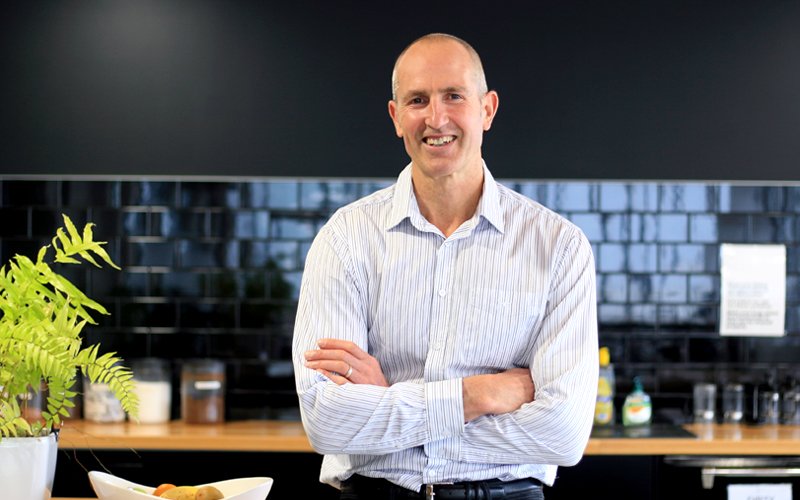22 Sep 2023
With Mental Health Awareness Week in full swing, we had a chat with Dr Nick Kimber, Engineering New Zealand Learning Partnerships Manager, Registered Nutritionist, personalised nutrition and health specialist, educator, and speaker. Nick outlines some tips to reconnect with your body and health, in keeping with this year’s focus on reconnecting with the things that lift you up.
Reconnecting with your body and your health – where does it begin?
It’s firstly about assessing your current lifestyle habits to establish what your priorities are, and what your daily rhythm or chronobiology looks like. Making progress in any area of life requires prioritising the most important aspects, so they feature in the top five of what you’re working on.
In other words, if your health and wellbeing is not in the top five, there’s very little chance you’ll give this area sufficient attention to make any progress.
The second key element of reconnecting is understanding the best schedule for you, encompassing your sleep (how many hours and when you go to bed and wake up), exercise, eating, focus or concentration time and your favourite environment – internal or external.
Can our thoughts, feelings, beliefs and attitudes really affect our biological functioning – our health? How would you describe the ‘mind-body connection’?
The mind-body connection is the interaction between physical and emotional health. It’s true that our thoughts, beliefs, attitudes and emotions elicit chemical and physical messengers such as hormones and neurotransmitters that can significantly alter our body responses. One example is the tightening of your stomach when you’re anxious.
To start positively enhancing your mind-body connection and the reconnection with your body and health, ask yourself simple questions to align your thoughts and assist with how you identify with the particular area of your life. For example, ask yourself “how can I nourish my body with food more effectively today?” or “how can I move my body more today?”.

Dr Nick Kimber, Learning Partnerships Manager at Engineering New Zealand.
How does eating well impact our wellbeing? Can a positive connection with food boost our mental health?
Food has an impact on our wellbeing in so many ways. Every time we eat, there’s an emotional response in our body that releases brain chemicals to satisfy hunger, provide reward, alter our mood, and replenish our reserves.
An emerging field of research called nutrition psychiatry confirms that what we eat has a significant impact on our mental health. Eating nutrient-rich foods such as whole fruits and vegetables that are full of vitamins, minerals, antioxidants, and phytochemicals nourishes the brain and protects it from oxidative stress – reactive oxygen-derived particles that damage tissues. On the flip side, eating highly-processed and refined food, high in sugar and low in fibre and nutrients impairs brain function and worsens mood disorders such as depression.
If the key to a good day is a good sleep, can you help us with some tips on getting a good night’s sleep?
A good night’s sleep is one the most important factors for your health – along with hydration. To enhance the quality of your sleep here are a few tips:
- Adopt a good routine (go to bed and wake up at the same time whenever possible).
- Avoid high amounts of caffeine for at least six hours before bedtime.
- Limit daytime naps.
- Include some form of physical activity in your daily routine.
- Switch off electronic devices at least one hour before bed and keep your phone off your bedside table.
- Take a hot bath or shower before bed to clear the mind and warm the body.
- Keep your room dark, at the right temperature, and quiet.
What is burnout and how do you know if you’ve got it? How do you manage unhealthy stress?
Burnout occurs when the body runs out of reserves and reaches exhaustion, due to excessive and prolonged emotional, physical and mental stress. You know you have burnout when there’s a feeling of being depleted and not having anything more to give. Performance drops, you’re disengaged, always negative, fatigued, and you’re struggling to see how things can improve.
One of the most effective ways to manage unhealthy stress is connecting with others to start counteracting the loneliness, cynicism and detachment that has been compounding over time. You can connect with family and friends, co-workers or join a community group. Prioritising self-care is also important. Unplug for five minutes a day, drink more water, increase your fruit and vegetable intake and take a five-minute walk outside. The recovery process will begin.
You’re not alone if you find being an engineer stressful. Learn how to cope with stress and maintain positive mental health with our wellbeing resources brought to you by the Engineering New Zealand Foundation.
Further resources
- Self-leadership: stress management, this module we have on offer will help you gain a practical understanding of what stress is, how it impacts your well-being and work, and strategies to manage stress. This module is free of charge to Engineering New Zealand members.
- The 5 Days, 5 Ways’ module on Āki Wellbeing Hub is a great tool for self-reflection, aligned with this year's Mental Health Awareness Week theme, '5 Days, 5 Ways'. Access to the Āki Wellbeing Hub is an exclusive benefit for members.





